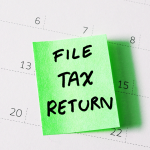BIR60 Form: A Walkthrough of the Individual Tax Return in Hong Kong
Tax season often comes with its own set of complexities and questions. For individual taxpayers in Hong Kong, the BIR60 form is a crucial document that shouldn’t be overlooked.
Issued by the Inland Revenue Department (IRD), this form is essentially your income tax return.
This guide aims to simplify the process by offering a step-by-step walkthrough of the BIR60 form.
The BIR60 form covers Property Tax, Salaries Tax, and Profits Tax of individuals. In particular, if you own a sole proprietorship business, you need to file for Profits Tax on the BIR60 form (Part 5).
What is Salaries Tax in Hong Kong?
Salaries Tax is a tax on income from employment and director’s fees, collected by the Inland Revenue Department (IRD) – the Hong Kong tax authority.
If you receive a tax return form (the BIR60 Individual Tax) from the IRD, you must complete and submit it by the deadline, even if you have no income subject to tax. Should you have liable income, but did not receive a tax return, you should inform the IRD.
Chargeable income that is earned by an individual and is subject to Salaries Tax include:
- Salaries, wages and director’s fees;
- Commissions, bonuses, leave pay and end-of-contract gratuities and payments in lieu of notice accrued on or after 1 April 2012;
- Allowances, perquisites and fringe benefits such as cash allowances, education benefits and holiday journey benefits;
- Salaries tax paid by employer;
- Termination payments and retirement benefits (depending on the nature and circumstances);
- Pensions;
- Back pay, gratuities, deferred pay and pay-in-arrears;
- Stock awards and share options;
- Tips received;
- Rental value of a place of residence provided by the employer.
Non-chargeable income that is not liable for Salaries Tax are severance payments, long service payments (paid in accordance with the Hong Kong Employment Ordinance), and jury fees.
Due Dates of the BIR60 Form
The year of assessment in Hong Kong runs from 1 April of the previous year to 31 March of the following year.
The BIR60 form is generally issued in early May each year, in a green envelope. The deadline is usually a month later (for paper filing) or 2 months for e-Filing or when the tax return is being handled by a tax representative.
Late submissions could result in penalties, so it’s crucial to keep an eye on these dates.
A Step-by-Step Guide to Filling Out the BIR60 Form
There are two ways to file the BIR60 tax return form: by paper or by e-Filing online.
- Paper filing
If you choose to file by paper, you should use the original BIR60 form that was sent to you by the IRD (the form in the bright green envelope).
- e-Filing
Filing your tax return online has the benefits of an automatic extension of 1 month for filing, pre-filling of data (if applicable) and a computation of your estimated Salaries Tax payable before submission.
You’d need to create an eTax Account. Requirements for creating such an account include not claiming any exemption, and not earning more than HK$2,000,000 of gross annual income in an owned sole proprietorship business. See all requirements here.
Part 1: Personal Particulars
Fill in your personal details accurately, including your full name and Hong Kong Identity Card number. Any mistakes here could lead to delays or issues with your tax filing.
If you’re married, you’ll also need to provide information about your spouse, even if you’re not opting for joint assessment.
Part 2: Notifications
If any of the notifications apply to your situation, tick the relevant Yes box and complete the relevant section(s) of the Appendix.
Part 3: Property Tax
Here, you’ll need to declare any properties in Hong Kong that are solely owned by you and rented out. The renting period and rental income should be specified, as well as any deductions. Ensure that all the figures are accurate to avoid any legal complications.
Part 4: Salaries Tax
This part reports any of your chargeable income as explained above (What is Salaries Tax in Hong Kong?). In Part 4.3 Deductions of the BIR60, you should put down the amount of actual expenses eligible for tax deduction, excluding any amount which has been or will be reimbursed by the employer or government.
Part 5: Profits Tax
If you have a sole proprietorship business, your earnings from that business should be reported in Part 5. Find the instructions on how to complete the boxes here.
Part 6: Election for Personal Assessment
If applicable (and subject to certain conditions), you can opt for Personal Assessment to potentially lower your tax liability. However, this is only applicable if you are subject to Profits Tax and/or Property Tax and/or Salaries Tax. If you are only subject to Salaries Tax, there is no need to elect for Personal Assessment. You might need professional advice to determine if it’s beneficial for you.
Part 7: Deduction for interest payments
You may claim deductions for home loan interest under Salaries Tax and Personal Assessment, if you are the owner of the dwelling and the dwelling is used wholly or partly as your place of residence. The interest that you pay is deductible from your net assessable income.
Part 8: Allowances and Elderly residential care expenses
Hong Kong allows for various allowances and tax deductions, such as personal allowances, MPF deductions, self-education expenses, elderly residential care expenses and approved charitable donations. Make sure you understand what deductions are permissible and include them in this section. A tax adviser can help you make the best of deductions and allowances for your situation.
Part 9: Declaration
This is the part where you sign the BIR60 form. If you have elected joint assessment with your spouse or have been nominated by your spouse to claim home loan interest deduction, your spouse must also sign in this part.
Legal Implications
Submitting an incorrect or incomplete tax return could result in fines, and in severe cases, legal action. It’s important to fill in the form accurately and meet the submission deadline to avoid such complications.
HKWJ Tax Law Can Help
The BIR60 form is an integral part of tax filing for individual taxpayers in Hong Kong.
While the form might seem daunting at first, understanding its various components can make the process easier.
Should you need any support, our tax advisers at HKWJ Tax Law can help you. Our services include filing the tax return for you or reviewing it before submission.
Contact us via the form below or email us at [email protected].






